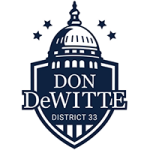Senators Return to Home Districts Before Final 7 Weeks of Spring Session
 The Senate was in session Tuesday, Wednesday and Thursday this week, and legislators are now back in their home districts until Tuesday, April 13. I will spend this time tending to local constituent issues and attending virtual committee hearings. When we return to Springfield in mid-April, we will be in session nearly every day over the final seven weeks of the 2021 spring session.
The Senate was in session Tuesday, Wednesday and Thursday this week, and legislators are now back in their home districts until Tuesday, April 13. I will spend this time tending to local constituent issues and attending virtual committee hearings. When we return to Springfield in mid-April, we will be in session nearly every day over the final seven weeks of the 2021 spring session.
Hundreds of bills moved through the Senate committee process last week, and while we took votes on a few bills on the Senate floor on Thursday, most bills that advanced out of substantive committees won’t be taken up until we return to Springfield in April. Up to this point the majority of our time has been spent in committees. When we return in April that will shift, and the bulk of our time will be spent on the Senate floor. April 23 marks the deadline for floor action on Senate Bills. After that point the Senate will review House Bills that received successful floor votes in the House.
On Thursday I recorded a short Springfield video update. You can watch that update here.
Senate forges ahead on redistricting despite census data not being available
Despite growing concerns about the public’s limited ability to provide input and the use of outdated and inaccurate census data, this week the Senate Redistricting Committee and sub-committees continued with rushed efforts to finish the redistricting process. I’m shown in this photo at a Thursday afternoon redistricting meeting with Senate Republican Leader Dan McConchie (R-Hawthorne Woods), where we voiced our frustrations and asked for more transparency and answers to basic questions.
Majority party Democrats are claiming that citizens can submit their own legislative map proposals using a tool and portal that is provided by the Legislature, but neither the tool nor portal has been available for the public to use because of the redistricting process’ fast-pace and delays with the new census data. In fact, the General Assembly will not have up-to-date census data until September.
Rather than delaying the redistricting process until the census data is released, Democrats continue to hold hearings as they attempt to finish before June 30. June 30 is a significant date, because if the legislative map is not finished by then, the Illinois Constitution automatically shifts the redistricting process to a bipartisan commission. Instead of relinquishing control of the map-making process, members of the Democrat majority have decided it is in their best interest to use faulty data and limited public engagement to create the new map.
I feel strongly that we should not rush the redistricting process, and should instead use the census delay as an opportunity to make sure we create truly fair maps. Throughout Illinois, there is overwhelming support for redistricting reform and the creation of an independent redistricting commission.
Click here to watch a short video about the importance of redistricting, and click here to sign my petition for fair maps.
High Price Tag Health Care Reform Bill Passes A massive and costly plan to overhaul health care in Illinois is heading to Governor Pritzker for final action. House Bill 158, which is the final pillar of the Legislative Black Caucus’ agenda, passed out of the Illinois Senate on March 25 with a 41-16 vote. The IL Department of Healthcare & Family Services estimates the cost to implement the provisions of HB 158 to be as high as $12 billion.
A massive and costly plan to overhaul health care in Illinois is heading to Governor Pritzker for final action. House Bill 158, which is the final pillar of the Legislative Black Caucus’ agenda, passed out of the Illinois Senate on March 25 with a 41-16 vote. The IL Department of Healthcare & Family Services estimates the cost to implement the provisions of HB 158 to be as high as $12 billion.
The proposal makes several changes, including giving the Health Facilities and Services Review Board the power to grant two-month extensions on moratoriums before hospitals in underserved communities are closed, creates a Health and Human Services Task Force and Anti-Racism Commission to recommend solutions to racial inequities in health care, and requires health care workers to complete an hour of implicit bias training per renewal period for licenses or registration. Additionally, House Bill 158 adds new Medicaid liabilities for the state by adding the coverage of doula and home-visit services for the prenatal, pregnancy and 12-month postnatal periods, as well as creating a new class of health care workers to provide community outreach, support and advocacy.
During his budget address last month, Governor JB Pritzker proposed a Fiscal Year 2022 budget that spends $41.6 billion. His spending proposal exceeds estimated revenue by $1.7 billion, and does not fund the evidence-based school funding formula as required by law (the Governor short-changed Education funding in the FY 21 budget too). Despite this budget reality, HB 158 would grow the total spending side of next year’s budget by 25% or more.
Many of the initiatives included in this massive bill are good ideas, and if broken down into several different bills I believe some would have received broad bipartisan support. Unfortunately, as has been the case with several other issue areas recently, rather than seeing a package of individual bills that could stand on their own merits, we were forced to consider one mammoth bill featuring several different initiatives and an unsustainable price tag. Governor Pritzker has suggested he will sign the bill.
Prejudgment interest bill passes General Assembly
On Thursday, the Senate passed Senate Bill 72, which increases liabilities and payouts for all personal injury lawsuits. Under this legislation, a prejudgment interest rate of 6 percent is added onto judgments awarded by the courts for personal injury or wrongful death cases. Previously, prejudgment interest was only applied to damages in specific cases that did not include personal injury or wrongful death, and was awarded at a 5 percent interest rate.
Without question, people who have been harmed by negligence or wrongdoing deserve to be compensated; however, I believe this legislation unfairly punishes any party, including small business owners and health care workers, who choose to dispute claims brought against them. SB 72 now heads to the Governor, who is expected to sign it.
Makers Madness Champion Crowned
After eight weeks of competition, the Self-Regulating Traffic Signal Heater manufactured by Termico Technologies in nearby Elk Grove Village has been declared the winner of the Illinois Manufacturers’ Association’s (IMA) second annual “Makers Madness” contest, giving them the coveted title of The Coolest Thing Made in Illinois.
Termico Technologies’ Self-Regulating Traffic Signal Heater uses conductive particles to heat traffic signals so they remain free of ice and snow and visible for drivers. This innovative technology has become critical for keeping motorists safe during winter weather. The Self-Regulating Traffic Signal Heater was chosen by voters out of a field of 311 individual products from across Illinois. There were over 300,000 votes cast throughout IMA’s Makers Madness competition.
Interagency report finds Illinois veterans’ homes lack proper infection control policies
The Illinois Department of Veterans’ Affairs (IDVA), the Illinois Department of Public Health (IDPH) and the U.S. Department of Veterans’ Affairs (USDVA) have released a joint report that finds Illinois’ four state-run veterans’ homes lack standardized infection prevention policies even though previous audits recommended their implementation.
The report is a result of the Interagency Infection Prevention Project (IIPP), which was created after the deadly COVID-19 outbreak at the LaSalle Veterans’ Home, which claimed the lives of 36 residents. The IIPP was created with the purpose to “support an integrated and comprehensive response to COVID-19” at the state’s veterans’ homes. Members of the IIPP team consisted of an infection control manager from the USDVA, two infection prevention consultants from IDPH, and a medical consultant from IDPH.
In the report, the IIPP found that IDVA and IDPH still hadn’t implemented uniform policies across its facilities despite the fact that the Illinois Auditor General recommended it in their May 2019 audit of the Legionnaires’ disease outbreak at the Quincy Veterans’ Home.
The IIPP report makes six broad recommendations for improving the response to COVID-19 and other potential viral outbreaks at the four veterans’ homes. Those recommendations are:
- Develop and implement system-wide policies, procedures, and practices for infection prevention;
- Expand system capacity for infection prevention;
- Broaden and deepen the perspective of the infection preventionists, positioning them to be conveners, coordinators, and communicators for Interdisciplinary Team efforts;
- Strengthen staff-wide training;
- Monitor adherence to policy and procedure to identify and correct gaps in a timely manner. Active, shared staff participation extends the reach of the infection prevention program and fosters staff ownership of key infection prevention processes; and
- Engage top management directly with front-line staff through Interdisciplinary Team rounds for infection prevention.
You can read the full report here.

